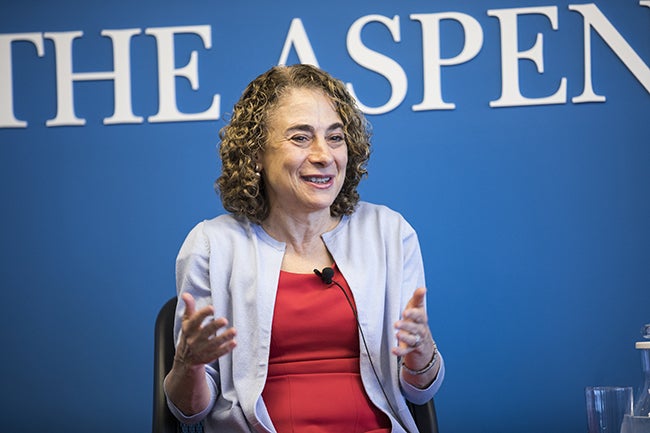DNC Chair Tom Perez and former RNC Chair Michael Steele visited the Aspen Institute as part of the Washington Ideas Roundtable series for a conversation on bipartisanship and governance, moderated by Mickey Edwards.
The pair of party leaders tackled pertinent political questions, focusing on the divided state of America’s political institutions.
How can the parties strengthen their brands?
The DNC has been criticized as out-of-touch, especially with younger voters and people who live outside of large cities. Perez said his vision is to change the way his party interacts with its constituents.
“We have to make more house calls,” he said. “I hear from people: ‘What do you stand for? You can’t show up in October and call that an organizing strategy!’ If we were in a business school marketing class, we would be talking about our brand degradation.”
The Democratic party is working simultaneously on its infrastructure and its messaging: Building the internal infrastructure allows the message to translate better, too.
Are you ‘for’ something or ‘against’ it?
Listening to what people say on Perez’s house calls will play a big part in his party’s future. Beyond listening, the DNC is aiming to better articulate what it stands for, not just what it stands against, he said. “We’re a party that embraces everyone, regardless of where you were born, who you live with, what you worship, or your first language. We’re about making sure that people have access to economic security. I’ve been trying to make sure we put our values into action.”
The reality, Steele said, is that every party chairman faces a challenge. The action is not truly in Washington, but at the community level around the country. And each community is unique, facing different issues and obstacles that politicians need to address. “What you have to try to do is link those communities with a common thought … Make the argument a little more personal, a little closer to where they are,” Steele said.
Focusing on the national scale, rather than meaningful community issues, could be fatal, he added. “Focus on Donald Trump all day if you want and you will lose, because it means you’re not listening to what people are actually saying that they want.”
Do established institutions still matter?
Perez and Steele are extremely aware that many Americans are feeling distrustful. They’re wary of parties, polls, and any mention of “establishment” politics. And that distrust is shaping how Americans interact with their government.
“The ‘establishment’ in the mind of voters is the thing that builds a wall to protect the interests of those inside the wall. But they’re on the outside, living the consequences. People are looking for ways to empower themselves,” Steele said.
And they can’t shake the feeling that they’re being lied to by people inside the wall. Voters, Steele said, have relied on the premise that once they vote for someone, that candidate will live up to their campaign commitments. “At a certain point, voters ask themselves: ‘Do they think I’m stupid?’ And they respond in kind. Voters are restless, and they will take away from the national parties and give to those who have an independent spirit. Both parties have a challenge on their hands. The system was designed to keep third-party candidates from growing, but grassroots could have a different mindset.”
American voters have the power to flip the system, he said. As committee chairmen, he and Perez might wield authority over the shape of the party, but voters can shift the paradigm completely. “American people have the power to do what they want to do,” Steele said. “If you get fat and lazy and just pull the ‘D’ or ‘R’ lever at your voting booth because that’s what you’ve always pulled, that’s what you get. But you can get behind systems that change things from the ground up.”


